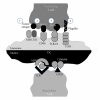T cells as vehicles for cancer vaccination
- PMID: 22131805
- PMCID: PMC3205726
- DOI: 10.1155/2011/417403
T cells as vehicles for cancer vaccination
Abstract
The success of cancer vaccines is dependent on the delivery of tumor-associated antigens (TAAs) within lymphoid tissue in the context of costimulatory molecules and immune stimulatory cytokines. Dendritic cells (DCs) are commonly utilized to elicit antitumor immune responses due to their attractive costimulatory molecule and cytokine expression profile. However, the efficacy of DC-based vaccines is limited by the poor viability and lymph-node migration of exogenously generated DCs in vivo. Alternatively, adoptively transferred T cells persist for long periods of time in vivo and readily migrate between the lymphoid and vascular compartments. In addition, T cells may be genetically modified to express both TAA and DC-activating molecules, suggesting that T cells may be ideal candidates to serve as cellular vehicles for antigen delivery to lymph node-resident DCs in vivo. This paper discusses the concept of using T cells to induce tumor-specific immunity for vaccination against cancer.
Figures

References
-
- Stevanovic S. Identification of tumour-associated T-cell epitopes for vaccine development. Nature Reviews Cancer. 2002;2(7):514–520. - PubMed
-
- Banchereau J, Steinman RM. Dendritic cells and the control of immunity. Nature. 1998;392(6673):245–252. - PubMed
-
- Sallusto F, Schaerli P, Loetscher P, et al. Rapid and coordinated switch in chemokine receptor expression during dendritic cell maturation. European Journal of Immunology. 1998;28(9):2760–2769. - PubMed
-
- Mayordomo JI, Zorina T, Storkus WJ, et al. Bone marrow-derived dendritic cells pulsed with synthetic tumour peptides elicit protective and therapeutic antitumour immunity. Nature Medicine. 1995;1(12):1297–1302. - PubMed
Publication types
MeSH terms
Substances
LinkOut - more resources
Full Text Sources
Other Literature Sources
Research Materials

